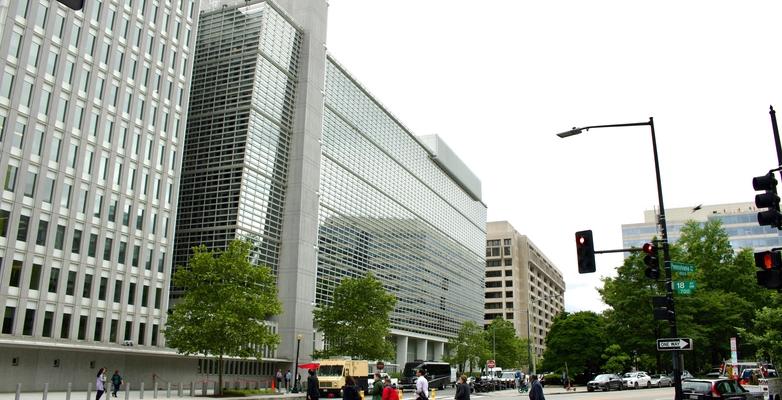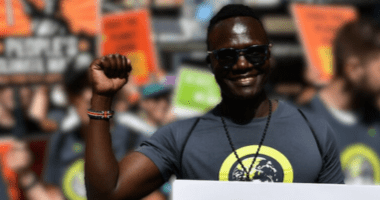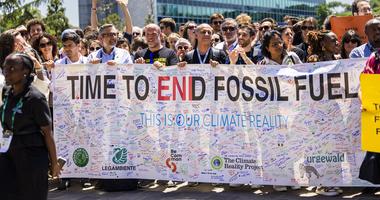
The World Bank’s New Balancing Act
4 min read
For months, World Bank watchers have been wondering what the new US administration would mean for the bank and its president, Ajay Banga.
At the annual spring meeting with the International Monetary Fund (IMF) in Washington, DC from April 21–26, they got an answer. Sort of.
Take Action: Tell Multilateral Development Banks to Stop Funding Fossil Fuels
Why the questions?
Since taking over in June 2023, Banga has explicitly connected climate and development in the bank’s work to a much greater extent than any of his predecessors. Just months into Banga's tenure, for example, the bank adopted a new vision to “Create a world free of extreme poverty on a livable planet.”
Critically, this shift has been more than just words on a website, with Banga committing – and shareholders agreeing – to increase funding for climate projects to 45% of annual spending. Last year, the bank introduced a new scorecard to measure impact in areas from “Affordable, Reliable and Sustainable Energy for All” to “Healthier Lives.” Critics noted significant gaps in the bank’s methodology here, but the sense of progress and steps in the right direction was real.
All of which seemed the put the bank on a collision course with a new White House literally removing the terms “climate crisis” and “clean energy” from government websites. Which wouldn’t be quite so concerning if the White House didn’t also happen to lead the bank’s largest donor nation and most influential shareholder.
Advocates reading the tea leaves couldn’t help but notice that the Project 2025 policy blueprint that has effectively served as a playbook for much of the Trump Administration so far calls for the US to leave the bank completely.
The threat was not an abstract one. Last year, the US pledged $4 billion to the International Development Association (IDA), the bank’s fund for the world’s poorest countries. But after meeting with the White House earlier in April, Banga told reporters he was unsure if the US would honor this pledge. The danger here was not merely a smaller funding pool, but the potential for ripple effects and other donors following the US out the door.
America First Means Conditions First
Three days into the spring meeting, the administration gave its answer. America was in, but on its own terms.
At an April 23 side event, US Treasury Secretary Scott Bessent laid out the administration’s position.
“America First does not mean America alone,” he said. “Far from stepping back, America First seeks to expand US leadership in international institutions like the IMF and World Bank . . . restore fairness to the international economic system.”
This leadership, he made clear, does not come without conditions, going on to criticize the bank and IMF for their work on climate and social issues.
“The IMF and World Bank serve critical roles in the international system,” he said, “And the Trump Administration is eager to work with them — so long as they can stay true to their missions.”
The subtext was clear: You’ve been expanding fossil fuels for decades – keep at it and we’re good.
IMF Managing Director Kristalina Georgieva acknowledged the criticism, but – to her credit – said the fund would continue supporting countries affected by climate change.
At the World Bank, Banga seems to be trying a different strategy: Change the subject. In conversations at the meeting and in bank communications, the constant refrain is about jobs, jobs, jobs as the engine for shared prosperity.
This approach is especially relevant to the bank’s work in the Global South, where an estimated 1.2 billion young people will be entering the workforce and competing for only 420 million jobs. So what can help create millions of jobs at the speed and scale necessary? Based on conversations at the meetings, clean energy.
It wasn’t just Banga focused on jobs building prosperity. The development committee of the bank’s boards of governors issued a statement calling for action to achieve “sustainable and resilient growth, promote macroeconomic stability, foster private sector investment, create more and better jobs, and boost productivity.”
So how does the bank achieve these goals? Both in meetings and public communications, a recurring theme was advancing reforms that de-risk investment and mobilize private capital.
What conversations about private capital often fail to acknowledge – but was a frequent subject at the spring meeting is the growing debt crisis and the rising cost of borrowing. Much of the climate finance offered to countries in the Global South still comes in the form of loans. While intended to support development, loans often deepen existing debt burdens, making it harder for countries to invest in job-creating clean energy projects and other climate solutions.
Where Do We Go From Here?
From the meetings, one of the key opportunities for civil society influence is through the bank’s Mission 300, a bold plan to expand energy access to 300 million people across Africa. At a time when clean energy is increasingly the cheapest form of new electricity almost everywhere and the green economy could create 3.3 million jobs across the continent this decade, the plan – which must include rapid expansion of renewables – has the potential to accelerate both clean energy transition and truly sustainable development.
From a civil society perspective, the challenge is to ensure this initiative does not repeat the bank’s mistakes of past projects that have displaced communities and worse. Inclusion of local communities in Mission 300 planning must be part of the process. The bank may also have to consider new financial mechanisms, such as WB-Multilateral Investment Guarantee Agency (MIGA) guarantees, to de-risk private capital in emerging markets and mobilize investment at the levels necessary for the Mission 300 goals.
Above all, what is clear is that while civil society will have to recognize the challenges of climate finance in our current environment, we cannot be silent. Whether under the rubric of creating jobs or advancing energy access or driving sustainable development, the bank has a critical role in climate action in the years ahead. Civil society has to keep pushing to ensure the bank fulfils it, no matter the language used.
Multilateral development banks (MDBs) in places like Africa, Asia, and Europe continue to finance fossil fuel projects that drive climate change and trap nations in unfair loans and a cycle of debt. Take action today and tell MDBs to stop funding fossil fuels.




